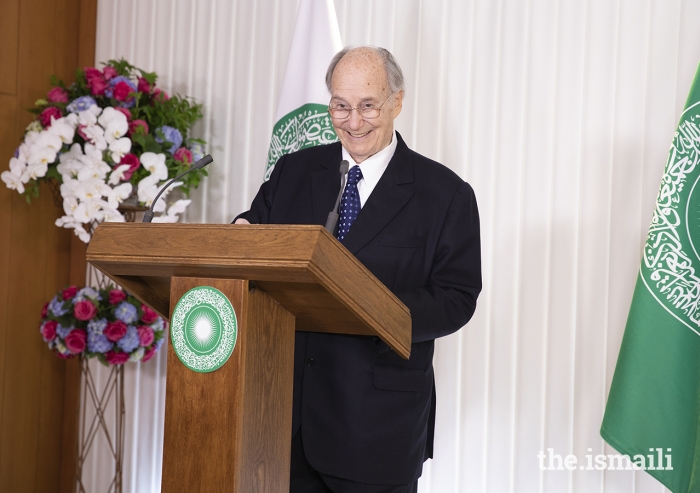Speech at the Opening Ceremony of the Ismaili Centre, Dushanbe
Speech by Mawlana Hazar Imam at the Opening Ceremony of the Ismaili Centre, Dushanbe on Monday, 12 October 2009.
Bismillah-ir-Rahman-ir-Rahim
Your Excellency President Rahmon,
Your Worship the Mayor of Dushanbe,
Your Excellencies,
Distinguished Guests,
It is a great honour for me to welcome you to this inauguration ceremony. I am deeply pleased to greet President Rahmon, who was here when together we laid the Foundation Stone for this building five years ago, and who has long been a steadfast supporter of the Centre project. The same thing is true of the Civic Authorities of Dushanbe, and we are also honoured to welcome His Worship, Mayor Ubaidullaev.
It is also a distinct pleasure to look out upon this audience and to greet so many other leaders, from so many walks of society. Your very presence here invests this occasion with special meaning, for you truly represent the broad diversity of this country – and your participation attests to the importance of pluralism in Tajik life.
We have looked forward to this event for a long time. And now that this day of dedication has come, let me also extend our warmest gratitude to everyone whose contributions have made this vision a reality. We salute those who have donated their time and talent and material resources to this project, including those who designed, constructed and decorated this building and its surroundings. You have created a remarkable building that will enhance the cityscape of Dushanbe, just as it reflects and re-interprets the materials and colours and inspiring landscapes of other iconic buildings of the larger region.
The Tajik Ismaili community has roots in this region that extend back more than a thousand years, as long ago as the second century of Islam. The community holds a recognised and admired position in the history of human endeavour here, contributing some of the greatest names in the fields of theology, philosophy, poetry and the sciences. This new Centre will be a place for looking back on that rich and powerful history in grateful and solemn remembrance. It will be a place, as well, for peaceful contemplation of the spirit, and of the world, as we live our lives in the present moment. And it will be a place to think about the future and how this profound heritage can shape and inform tomorrow's world. This Centre aspires to give physical form and spiritual space for pursuing all of these objectives.
As we look around us today, we are reminded of other times down through history when a variety of cultures and traditions have come together happily in this land. It is inspiring to remember how enriching encounters of ideas and viewpoints have so often prevailed against opposing forces of ignorance and prejudice. The remarkable flowering of human talent here has owed much to the pluralism of Tajik society. I am proud, in noting just one reflection of that tradition, that this Centre is located in a neighbourhood that celebrates the great names of Ismoili Somoni and Rudaki.
The continuing pluralism of human endeavour will be manifested in the life of this Centre. It will be reflected in an array of exciting activities, serving people of many different backgrounds. The Centre will have a space for congregational gathering, just like the array of Ismaili Centres in major cities across the world, both those which are now being developed and those that already exist, from London to Vancouver and Lisbon to Dubai. In addition, we hope and trust that people of all faiths and background will gather here for educational and cultural events – for seminars, lectures, recitals and exhibitions. We will seek to demonstrate that spiritual insight and worldly knowledge are not separate or opposing realms, but that they must always nourish one another, and that the world of faith and the material world are the dual responsibilities of humankind.
In recent years, the people and the leaders of this region have been called upon to manage a sometimes turbulent transition, from a time of seeming certainties to a still unfolding era of open horizons and changing opportunities. The Holy Qur'an calls upon Muslims to compete in good works, and just as the Ismailis have done for centuries in this lovely land, we will uphold that responsibility in service to the Tajikistan of today and tomorrow.
One of the beauties of ceremonies like this one is that they link us to people in other places – and to people of other ages. I remember, to mention just one example, how the 1000th anniversary of the birth of Syedna Nasir-i-Khusraw coincided with our foundation stone ceremony five years ago. It is a tribute to Tajik culture that the legacy of such figures, even from the distant past, is held in such high esteem, promoting a strong sense of history and a strong spirit of social harmony.
This ethic of connectivity with others has deep spiritual roots – in Islam as for other faiths. It stems ultimately from humankind's sense of humility in the presence of the Divine. In this light, human diversity itself is seen as a gift of Allah, cultural differences are embraced as a blessing, and different interpretations of faith are seen as a mercy, one that nourishes the Ummah's vast identity, and its constructive interface with society at large.
In this spirit, it is our prayer that the Centre will always radiate an inviting mood of friendship to one and all, proclaiming Islam's message of one humanity, and joining its voice with so many other voices in this city and this country in affirming our shared responsibility for advancing the common good.
Thank you.







